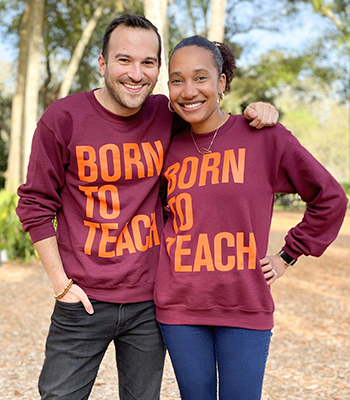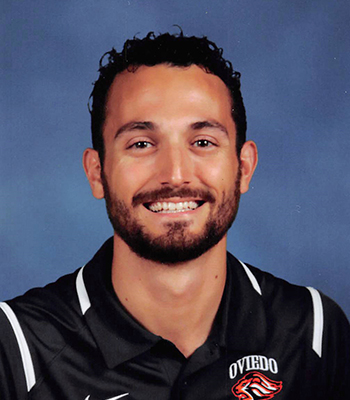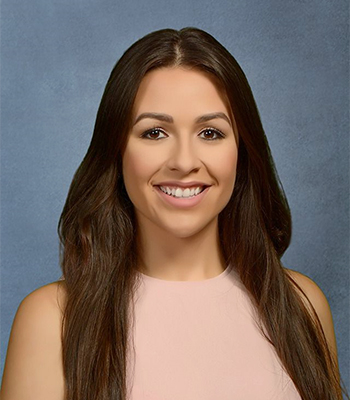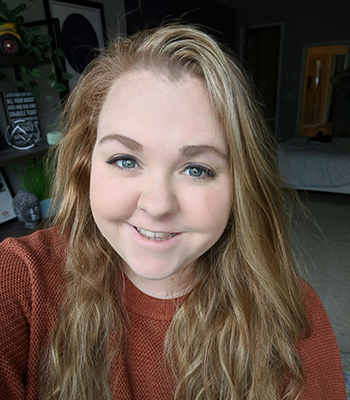Four teacher education alumni share why they teach and how they navigate remote learning.

The first week of May is Teacher Appreciation Week, and we want to celebrate the hard work and dedication of teachers. This year, we spoke with four teacher education alumni about what inspired them to pursue a career in education and how they are navigating remote instruction and learning.
Elementary Education: Chris Pombonyo '12
Elementary School Teacher and Instructional Coach
 Chris Pombonyo ‘12 and co-teacher Nikhail Slaughter
Chris Pombonyo ‘12 and co-teacher Nikhail SlaughterAt 9 a.m. hundreds of Midway Elementary School students and their families, along with faculty and staff, tune in for the Morning News Show hosted online by Chris Pombonyo ‘12. A third-grade co-teacher and instructional coach, Pombonyo says the morning show keeps everyone connected and excited about school in this time of social distancing.
“It’s the highlight of my day. We have spirit days and read-alouds, showcase students doing great work and invite a featured teacher who gives everyone at the school a challenge of the day. And I love to see the live chats during the show from our school community encouraging each other,” says Pombonyo, who received his bachelor’s degree in elementary education and is pursuing his master’s degree in educational leadership.
After announcements, Pombonyo begins his day as he did before remote instruction — coaching educators while Nikhail Slaughter teaches math to their third-grade class. The co-teachers switch midday and Slaughter coaches educators while Pombonyo teaches English language arts to the students.
Pombonyo, the 2017 Seminole County Teacher of the Year, values community in the classroom. His teaching approach focuses on engagement, rich with collaboration and hands-on activities. Even remotely, he offers ways to increase engagement, challenging students with scavenger hunts in their homes and other high-energy activities.
“When you engage students with unique ideas and activities, you can increase rigor, and they’ll work harder and gain that information a lot faster.”
Pombonyo is also creative director and a presenter for Get Your Teach On, a conference that inspires and motivates thousands of teachers a year and provides tools that focus on student engagement to increase rigor in the classroom.
In the future, Pombonyo says he might become a principal, and one day, teach at UCF. But whatever his next steps, he wants to continue work with students and teachers because these relationships are important to him.
Growing up, Pombonyo remembers watching his mother in her pre-school classroom and the way she built relationships and motivated students. He said he knew he wanted to be a teacher then.
“If you connect, you make an impact. To see students motivated to learn, or when something blows their mind, or when they come back years later and say they remember a lesson. All this motivates me. It is why I teach.”
A few weeks ago, Pombonyo and Slaughter drove to each student’s house and dropped off lawn signs with ‘My Teachers Miss Me’ and the co-teachers’ photo on it.
“We made it to every student’s house, and let each parent know so they were home and we could wave to them from the car. It was the best four hours of my life.”
Secondary Education: William Furiosi ’13 ‘14 MAT
High School Teacher
 William Furiosi ’13 ‘14MAT
William Furiosi ’13 ‘14MAT“I teach for the opportunity to share all the scientific knowledge I learned from so many great teachers over the years and encourage future doctors, scientists and engineers,” says William Furiosi ’13 ‘14MAT, who received his bachelor’s degree in biomedical science and master’s degree in science education.
Growing up, Furiosi moved to eight different schools over 12 years. He says despite the unpredictability of his situation, he was fortunate to have good teachers along the way. He also had a knack for teaching early on, helping friends who might have struggled in different academic subjects.
When Furiosi earned his bachelor’s degree in biomedical science, he intended to enter medical school. However, right before taking the MCAT, he heard about the RTP3 program, which was a state-funded grant for students pursuing a Master of Arts in Teaching designed for a unique cohort of next generation scientists, mathematicians, physicists, computer scientists and engineers. With this opportunity, Furiosi had a change of heart and enrolled in the teacher education program.
Furiosi says he entered the graduate program with a strong understanding of science, but learned a lot about the field of teaching, especially the need for accommodations when helping his students learn depending on their specific needs.
After graduation in 2014, Furiosi joined the faculty at Oviedo High School to teach three courses: Advanced Placement Biology, Chemistry with a focus on reading comprehension and Experimental Science (where students do original research and compete in science fairs). Because of the many positive experiences, students flock to his courses to prepare for STEM careers. This 2021 Seminole County Teacher of the Year is also a champion for students, providing valuable experiences that will prepare them to attend a place like UCF.
Furiosi says much of the research out about COVID-19 is not currently peer-reviewed and he is using this as an opportunity to teach students to think more critically about the validity of studies. He also encourages students to look at failure as an opportunity.
“I tell them that if we knew everything, we wouldn't be in school. We can embrace failure rather than run from it, because it gives us the opportunity to grow.”
Furiosi is in his seventh year teaching and plans to increase enrollment and access to his Advanced Placement Biology and Experimental Science research classes, along with creating a strong university partnership between the high school and university labs.
Early Childhood Development and Education: Marcella Crutcher ’16
Preschool Teacher
 Marcella Crutcher ’16
Marcella Crutcher ’16When Marcella Crutcher ’16 was in kindergarten, she declared that one day, she would be a kindergarten teacher. From that dream, she has never wavered.
“I teach because I love children, and I love to help them in whatever way it is that they need — whether that’s teaching them academics, love, kindness or empathy. I think there’s nothing greater than being a source of light to someone and instilling in them that learning is something that’s great and an avenue to so many different opportunities,” says Crutcher.
During high school, Crutcher participated in the early education program, where she earned her certifications to become a preschool teacher. When she came to UCF and enrolled in the early childhood development and education major, she was interning and working part-time in both public and private schools. Crutcher says when she wasn’t in school as a student, she was in her mother’s classroom. “My mom was a former teacher, and she inspired me to become one too.”
Crutcher currently teaches a full-day preschool program at Good Shepard Catholic School, where she’s been since she graduated. She’s also working on her master’s degree in early childhood development and education in an effort to advocate for the importance of this particular field as well as one day educate and inspire future teachers. “Teaching does not exist in a perfect world, and I want to help future educators understand the reality of teaching,” she says.
This fall, she’ll be transitioning to kindergarten teacher — fulfilling that childhood dream.
“I’ll be able to see the further development of reading skills beyond phonological awareness,” says Crutcher. “Seeing that growth in the kids is one of the most special times because you’re teaching a child to read — that’s going to be the foundation for the rest of their academic careers and lives.”
But for right now, Crutcher’s focus is on helping her young students learn remotely. She admits that the unique challenge presented by COVID-19 is that she’s having to teach the parents how to teach their children how to say certain sounds or write in a child friendly way. “I think it’s been a way for parents to connect to their child and really see and understand what their child does every day,” she says. “I think it’ll be interesting to see the dynamic that comes after we go back to our normal routine.”
In the meantime, Crutcher spends her days recording videos, putting together PowerPoint presentations to send to her students (and their parents) and incorporating games and experiments. Every Friday, she and her students have a zoom call where they mimic their old Friday morning routine of prayer, dance and reading aloud. “It’s a collaborative effort,” says Crutcher. “But you do the best that you can and adapt like you would in a classroom.”
Exceptional Student Education: Danielle Gillespie ’16
Special Education Teacher
 Danielle Gillespie ’16
Danielle Gillespie ’16When Danielle Gillespie’s ’16 younger brother was diagnosed with ADHD in second grade, the then-fifth grader watched her sibling get held back year after year, due to his inability to complete his coursework. Being the older sister, she took it upon herself to teach him. She sat with him each night and tutored him through his homework. He’s now in college with the goal of becoming a surgical technician.
“I realized that if people just put in some time to work with him a little more and try things in a different way, then he would get it, and he did,” says Gillespie.
She chose a career path that would help her make that kind of impact in other young learner’s lives. “I really wanted to make an impact for those students who the families, and even society, didn’t think they could do things based off their label or their disability. My whole purpose is to show that they can; they just need to be given the right tools and shown the right way to succeed.”
Gillespie is currently working on her master’s degree in exceptional student education from UCF. She also works for UCP of Central Florida at the Pine Hill’s campus, teaching a class of second graders and being the lead teacher for the campus’ kindergarten through fifth grades, where she assists with curriculum needs.
Her end goal is to earn a doctorate and design curriculum specialized for students with disabilities. “It’s not very common to find materials for our students, and I think it’s becoming more common in schools to implement an inclusion model,” she says. “But teachers have a hard time with that given our current curriculum doesn’t address all of our students’ needs.”
Gillespie admits that her job as a second-grade special education teacher has shifted tremendously due to COVID-19, but she’s taken it all in stride and has found enjoyment in this new way of teaching. In fact, she helped create a website and live stream for the students. Teachers throughout the UCP campuses (of which there are eight in Central Florida) present lessons remotely, and then the students move into small groups, where they can work one-on-one with the teachers. Gillespie says some students who had trouble speaking or writing have begun to thrive in this environment. “It’s showing me, as a teacher, that when we go back to the brick-and-mortar setting, I could integrate more technology and they would enjoy it and excel.”